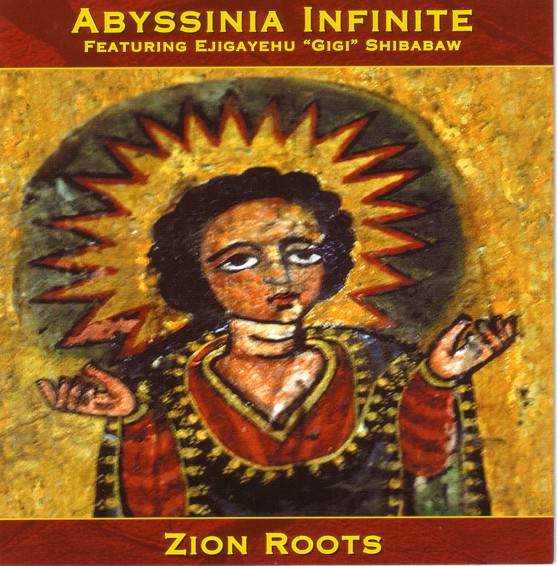ABYSSINIA INFINITE featuring GiGi


1/ Bati Bati (Traditional) 3.45
2/ Gela (Shibabaw) 6.08
3/ Alesema (Shibabaw) 7.26
4/ Monew Natana (Traditional) 5.12
5/ Embe Ashafergne (Shibabaw) 4.27
6/ Gole (Traditional) 6.03
7/ Aba Alem Lemenea (Shibabaw) 4.15
8/ Gedawo (Traditional) 4.42
9/ Lebaye (Shibabaw) 4.47
10/ Ethiopia (Shibabaw) 6.15
Created at Orange Music Sound, W. Orange, New Jersey and Washington D.C.
Engineer at Orange Music: Robert Musso
Engineer in Washington: Abegasu Shiota
Assistant at Orange Music: James Dellatacoma
Produced and arranged by Ejigayehu "Gigi" Shibabaw and Bill Laswell
Executive Producer: Christian Scholze
Digitally pre-mastered and mastered by Radu Marinescu and Christian
Scholze at Acoustic Entertainment, Cologne
Ejigayehu "Gigi" Shibabaw: vocals; Abegasu Shiota: production, keyboards; Moges Habte: tenor
saxophone; Melaku Gelaw: washint (flute), kirar (harp); Tony Cedrars: accordion, acoustic
guitar; Bill Laswell: acoustic guitar, keyboards; Ayib Dieng: percussion; Karsh Kale:
percussion; Tigist Shibabaw & Teddy Shibabaw: vocals.
2003 - Network Medien (Germany), 24.971 (CD)
After the coup, similar events occurred in both Ethiopia and Jamaica - music went from live instrumentation rooted in blues, R&B, rock and jazz to synthesizers and drum machines. Organic sounds gave way to primitive digitalism, and with songs went the culture: Ethiopia to (literally) insane degrees of impoverished living, and much the same in Jamaica as Western corporations moved out after exhausting supplies of bananas and other natural resources. To this day, Jamaica's major sonic export has been dancehall (born in those early drum machine days), and Ethiopia a form of smooth jazz not quite '80s, though somewhat more "organic." Besides a few leftover Ethiopiques re-releases, America knows little of the music once dear to Ethiopia.
Enter Ejigayehu Shibabaw, more commonly known as Gigi. An Ethiopian native who fled to Kenya in pursuit of a musical career, she ended up in New York a few years ago to spread her homeland sound. On Gigi, which garnered critical acclaim, she worked alongside (and subsequently married) bassist/producer extraordinaire Bill Laswell, who affectionately treated the percussively mellow, horn-driven jazz with trademark subterranean bass lines. The key factor, however, was (and has always been) Gigi's voice, a cross between mythic angelicism and a roving deepness counterpart to Baaba Maal.
Abyssinia Infinite, released on German label Network, revisits the days of Mahmoud Ahmed, Sèyfu Yohannès and Tèshomè Meteku with an distinctively tribal, at times fairy tale feel. Laswell produced and constructed Zion Roots, gathering a slew of native jazz musicians to form a backdrop mimicking the heyday of Ethiopian soul. Karsh Kale joins in on tablas to add an Asian influence, while Laswell's production slant - always rooted in dub - rekindles the Jamaican/Ethiopian connection. A rollicking drum line on "Gole," a traditional song reserved for weddings and holidays, as well as a gorgeous reworking of "Ethiopia" (originally released on Laswell's Dub Chamber 4 disc) are highlighted hints of this commendably dedicated venture. Gigi's potential and actuality are now manifesting in an evolving periphery bent on a passion for home, while knowing home circumnavigates the globe.
Derek Beres
Ethiopia's most intriguing young singer, Ejigayehu "Gigi" Sibabaw has never sounded this good on record. Her eponymous international debut on Palm Pictures in 2001 set her flowing, devotional and love songs in a jazz-pop context with help from the likes of Wayne Shorter and Pharoah Sanders, and production by Bill Laswell. This group--also produced by Laswell--goes for a more organic sound long on acoustic atmospherics and gently rolling percussion, much of it tabla by world club maverick Karsh Kale.
The music here is textured and elegant, complimenting rather than crowding Gigi's searing, evocative voice. "Bati Bati" opens the set in a spiritual mode, with Gigi blending timbers with a saxophone, a staple of Ethiopian pop. Some of the melodies in these ten songs echo tracks on Gigi's earlier albums--her 1998 release, One Ethiopia, the album that caught Chris Blackwell's ear, is available now on Stern's--but here, personal and folkloric airs are transformed anew. "Alesema," a melodious folk song, finds Gigi's vocal floating on a bubbling bed of plucked strings and light percussion. The most rhythmically driving tracks split the difference between ritual pulse and chant and ambient club groove, but it's Gigi's confidence as a singer that makes this production excel. She shifts easily from a whispering purr to a full-throated wail, and in the process, a vivid and alluring personality emerges.
Revised and expanded from review that first appeared in the Boston Phoenix.
Banning Eyre (courtesy of the Afropop website)
Two years ago, the Ethiopian singer Ejigayehu "Gigi" Shibabaw recorded a best-selling Africa-funk-jazz crossover set, simply titled Gigi, in which she was joined by a celebrity cast that included the likes of Wayne Shorter, Herbie Hancock and David Gilmore.
Now she's back with another excellent, more African-influenced album, on which she sings lead vocals, has written all the songs that aren't traditional, and acts both as co-producer and arranger. And yet, mysteriously, this is not being promoted as a Gigi album. It's titled Zion Roots, which makes it sound like a mediocre reggae set, and it's credited to Abyssinia Infinite "featuring Gigi".
The result is far more interesting than the packaging would suggest. The musicians are mostly Ethiopian, and are joined by the album's co-producer Bill Laswell, playing keyboards and acoustic guitar.
4 stars out of 5
Robin Denselow (courtesy of the Guardian Unlimited website)